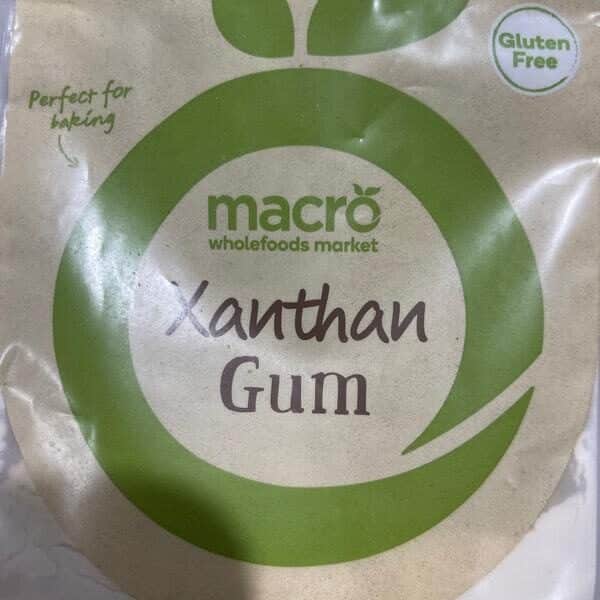Perhaps you checked the ingredients label on your dog’s food and got surprised to see xanthan gum listed as an ingredient?
Maybe you’ve heard people discussing the safety of xanthan gum in dog food and are wondering what all the fuss is about.
Either way, you’re probably curious about this strange-sounding additive.
So, what is dogs xanthan gum?
Xanthan gum is a thickening agent and stabilizer derived from the bacterial fermentation of sugar.
It’s added to some dog foods to help thicken and stabilize the feed and control the food’s consistency.
Dogs xanthan gum elicits controversy because it is a relatively new additive, and some people believe it may either be harmful or beneficial to dogs.
This article will discuss everything you need to know about xanthan gum in dog food, including its benefits and risks.
We’ll also provide tips on choosing dog food made with xanthan gum.
Why is Xanthan Gum Added to Some Dog Foods?
You might add xanthan gum to dog food, as it helps thicken and stabilize the food, especially in wet or canned dog foods, which tend to be thinner and less stable than dry foods.

Dogs xanthan gum also helps control the consistency of the food, which is vital for both manufacturing and aesthetic reasons.
Manufacturers prefer dogs xanthan gum because it is a relatively inexpensive way to thicken and stabilize food, easy to use, and has a long shelf life.
Aesthetically, xanthan gum helps create a smooth, consistent texture in wet dog foods, which some pet parents prefer.
Moreover, dogs xanthan gum is a source of dietary fiber. Remember, dogs need fiber for healthy digestion.
Fiber also helps regulate blood sugar levels and provides other health benefits that we will be talking about later.
Why is Dogs Xanthan Gum Controversial?
Some people believe xanthan gum may be harmful to dogs because it is an unproven additive.
It hasn’t been adequately tested hence the possibility of causing digestive problems in dogs.

Others maintain that xanthan gum is safe for dogs and argue in its favor since the benefits outweigh the risks.
They point out that xanthan gum is a source of dietary fiber and an essential additive in wet or canned dog foods.
Generally speaking, there is no need to worry about your dog eating xanthan gum.
It’s a safe, valuable ingredient in various human foods and is even used in some medications and medical treatments.
That said, as with any food additive, it’s possible that some dogs may be allergic to xanthan gum or may have an intolerance to it.
If you notice your dog having any adverse reaction after eating food containing xanthan gum, such as vomiting or diarrhea, please contact your veterinarian.
Due to these reasons, some people are against adding xanthan gum to dog food.
For instance, they claim it is a processed ingredient and might not be as easily digestible for dogs as other ingredients in their diet.
Thus, the preference to feed dogs naturally with unprocessed ingredients.
Some people believe xanthan gum is unnecessary because it is simply added to dog food as a filler ingredient, thus, it lacks any tangible benefits for dogs.
Benefits of Adding Xanthan Gum to Dog’s Food
Besides being an emulsifier and thickening agent, xanthan gum has many other benefits for your dog. These include:
Regulating Blood Sugar
Dogs xanthan gum help regulate blood sugar levels by slowing down glucose absorption in the intestines; this is especially important for diabetic dogs who need to control their blood sugar levels carefully.
It turns the fluid in the dog’s stomach into a viscous gel, slowing down the digestion process and preventing spikes in blood sugar levels.
Improving Digestion
Xanthan gum helps improve digestion by stimulating the growth of healthy bacteria in the gut, which is critical for overall gut health and helps prevent diarrhea-related digestive problems.
Once your dog eats food with xanthan gum, it will form a gel-like substance in the stomach which protects the lining of the gut and help food move through the digestive system more smoothly.
Besides, the dietary fiber in xanthan gum also helps add bulk to stools, which helps with constipation.
Reducing Inflammation
Dogs xanthan gum has anti-inflammatory properties, which help reduce inflammation throughout the body and are essential for arthritis, allergies, and even cancer.
A small amount of xanthan gum has a significant impact on reducing inflammation.
Control Cholesterol Levels
Feeding your dog xanthan gum helps control cholesterol levels by binding to bile acids in the gut and preventing their reabsorption into the bloodstream.
This helps with overall heart health by preventing various cardiovascular diseases. Your dog’s cholesterol levels will improve within a few weeks of adding xanthan gum to their diet.
Saliva Substitute
Dogs with dry mouths often have trouble eating and drinking. Xanthan gum helps by lubricating the mouth and throat, making it easier for your dog to swallow, especially in older dogs susceptible to dehydration.
Xanthan gum acts as a saliva substitute for dogs who cannot produce enough saliva, keeping the mouth moist and preventing bad breath, dry mouth, and tooth decay.
Adding a small amount of xanthan gum to your dog’s water bowl helps keep their mouth healthy and hydrated.
For better results, talk to your veterinarian before making any changes to your dog’s diet to help determine if xanthan gum is suitable for your dog and how much to add.
Risks of Adding Xanthan Gum to Dogs Food
Despite the above benefits, there are risks to feeding your dog xanthan gum.
The most common side effect is gas and bloating. This is because xanthan gum is a high-fiber food additive that causes digestive problems in some dogs.
If you notice your dog having any adverse reaction after eating food containing xanthan gum, such as diarrhea, vomiting, or constipation, stop feeding them the food and consult your veterinarian.
Xanthan gum can also be harmful if your dog ingests too much.
Symptoms of xanthan gum poisoning include difficulty breathing, swelling of the throat or face, and collapse.
Contact your veterinarian or local animal hospital if you think your dog has ingested too much xanthan gum.
Tips on How to Choose Dog Food with Xanthan Gum
- Talk to your veterinarian before making any changes to your dog’s diet to help determine if xanthan gum is suitable for your dog and how much to add.
- Pick high-quality, all-natural dog food brands that use xanthan gum as a thickener or stabilizer in their recipes.
- Avoid dog food brands that use cheap fillers such as corn, wheat, or soy in their recipes.
- Look for dog food recipes that contain other healthy ingredients such as lean meats, fruits, and vegetables.
- Avoid dog food brands that use artificial flavors, colors, or preservatives in their recipes.
- Check the ingredient list to ensure xanthan gum is listed towards the end and in small amounts.
- Pick food where xanthan gum is an inactive ingredient and not the primary source of nutrition or calories.
- Choose age-appropriate dog food recipes designed for puppies, adults, or senior dogs.
- Feed your dog according to the recommended serving size on the food label to avoid overfeeding them.
- Monitor your dog’s health closely after adding xanthan gum to their diet, and contact your veterinarian if you notice any adverse reactions.
Conclusion
Xanthan gum is a food additive that offers many benefits for dogs, including improving gut health, controlling cholesterol levels, and acting as a saliva substitute.
However, there are also risks associated with feeding your dog xanthan gum, such as gas and bloating.
If you notice any adverse reactions in your dog after eating food containing xanthan gum, stop feeding them the food and consult your veterinarian.
With a bit of research, you can find high-quality dog food that’s right for your dog and its individual needs.
- What Dog Breeds Have Pink Skin? - March 24, 2023
- What Are the Most Inspiring Dog Breeding Quotes? - March 20, 2023
- Can Pheromone Spray Help Improve Dog Breeding Results? - March 19, 2023








